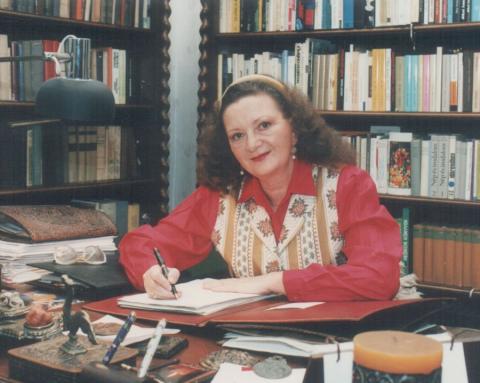Jókai Anna: Biography
Anna Jókai (Budapest 24 November 1932 – Budapest, 5 June 2017)
Two-time Kossuth Prize and Attila József Prize-winning writer and poet, awarded the title of Artist of the Nation. From 1998 until her death she was a founding member of the Digital Literature Academy.
*
Born on 24 November 1932 in Budapest, the second child of a bourgeois family. Her mother, a housewife, wanted to protect her younger child from all difficulties. Anna Jókai was influenced by her immediate surroundings of Józsefváros – or to be more precise, only those parts of the district that her mother let her explore.
Books fell into Anna Jókai’s hands at an early age, and her life, otherwise isolated from her peers, was enriched by imagination and reading. And not only children’s literature, but also books for adults.
Between 1939 and 1942, she was a student at the elementary school at Mária Terézia Square. In the fourth grade, her teacher used her essays as models for the other students, and in needlework class she had her tell stories to her classmates. Between 1943 and 1951 she studied at the Ilona Zrínyi Girls’ Secondary School, by which time she had already begun to write what she would later call „poems” and „short stories”.
She later became estranged from her mother: the world that had been closed to her had begun to open up, and her mother could not tolerate it. Writing had faded away, at least as a possible occupation or purpose in life. Anna Jókai applied to the Academy of Fine Arts and to university, but she was rejected, and while her relationship with her mother became increasingly difficult, no less. The future writer had to find work to support herself: she worked as an accountant for the Budafok Wine Bottling Company from 1951 until 1953, the year in which she married Róbert Bánky, a „forbidden childhood friend”. No one from the family was present at the church wedding (it was from this marriage that her children were born: Gábor in 1955 and Nóra in 1957).
From 1953 she was an art lecturer at the Department of Popular Culture of the 11th District Council, after being singled out by a „council appointee”, but was dismissed in 1957 for „expressing an opinion”. As she later wrote of this period: „Lots of humiliation, but lots of valuable experience. Sensitivity, and now to the fate of others. It is here that not becoming a writer begins to pain me.” However, in the autumn of 1956 she was accepted to study Hungarian history at Eötvös Loránd University, and she graduated in 1961. After graduating, she taught at the Jázmin Street Primary School until 1970.
In 1963 she began to return to writing, to the thoughts and desires of her childhood. In the meantime, she divorced her first husband and married Dr. Endre Török in 1964. Her first short story, Family Circle (Családi kör), was published in Kortárs in 1966, and her first novel, 4447, in 1968. Contemporary criticism evaluated the world of her writings, depicted with such stark frankness, as realism or naturalism. Her writing gradually developed into what she herself called „spiritual realism”.
In 1970 she was awarded the Attila József Prize, and in the same year she started working as a teacher at Vörösmarty High School until 1976. She then became a freelance writer.
From 1970 onwards, while her novels were being published almost every year, she was experiencing difficult personal crises. She divorced again in 1972 and lived alone for many years. She remarried in 1983 (to Dr. Sándor Kapocsi). In 1980 (the year of Solidarity), she was awarded the Pietržak Prize by the PAX publishing house in Poland for her novel Days (Napok), which had until then been censored. Her works were soon translated into foreign languages (Polish, Czech, Slovak, Slovenian, German, Bulgarian, Ukrainian, Russian, English). Despite her professional „loneliness”, she was a member of the Hungarian Writers’ Association from 1970, and vice-president from 1986 to 1989. During the years of the regime change, when Hungarian literary life was becoming increasingly divided, she was president of the association from 1990 to 1992, and later a member of the board of trustees.
From 1992 she was a founding member of the Széchenyi Academy of Letters and Arts, and from 2000 she became a member of the Hungarian Academy of Arts. In 1998 her novel Don't Be Afraid (Ne féljetek) was published. Although she has said on several occasions after the publication of Don't Be Afraid that she would not write any more novels, in 2007 she published Godot Arrived (Godot megjött), a novel that echoes Samuel Beckett’s play, Waiting for Godot, and Imre Madách’s Tragedy of Man. In 2012 a new novel, Hungry Life (Éhes élet), was published.
On 20 August 2012 she was awarded the Grand Cross of the Order of Merit of Hungary, and on 15 March 2014 she received the Kossuth Grand Prize.
After a long and serious illness, she died in Budapest on 5 June 2017.
The biography was written by Domonkos Csábi, translated by Benedek Totth and Austin Wagner.

